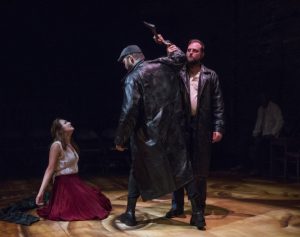THE RIGHT TO DO WRONG
Count this among the finest offerings from a Chicago theater: Shattered Globe Theatre’s kinetic staging of Chris Hannan’s adaptation of Crime and Punishment is flawlessly directed by Louis Contey, Eleven actors simultaneously attain personal bests in 155 minutes.
First, however, a look at the roots of this wonder: Following his return from a decade in exile in Siberia as a dissenter against the Romanov order and the enslavement of the serfs, Fyodor Dostoevsky intended his second novel, written as much to pay off gambling debts as to share a story, to be called The Drunkards: It would depict how alcohol destroys a family from the inside out. But slowly the pen of this playful polemicist took a different course: A terrible exploration in fiction was to begin. Dostoevsky wanted to flesh out a theory into fiction, answering a very non-rhetorical question: Is morality absolute or is human behavior a matter of Machiavellian ends justifying their means? Are our acts to be praised or condemned solely depending on their outcome?
By the time it was published in 1866, the character of Rodion Raskolnikov had taken over Crime and Punishment. Doestoevsky’s anarchic anti-hero imagines himself a self-appointed superior being, above constraints of right and wrong. Reflexively, he commits a crime — a double homicide — that allows his author to chronicle a murderer’s evolution from hubris to regret to redemption.
Raskolnikov endures as a kind of literary experiment — to imagine the kind of person that would happen if God was dead and all things were possible. R. anticipates the twisted Chicago lovers Leopold and Loeb, self-declared “supermen” who imagined themselves beyond the law as they attempted the “perfect crime” by murdering Bobby Franks.
Likewise our R: Gifted with a perverse sense of entitlement, this poor Saint Petersburg student and would-be lawyer contemplates his own flawless felony: He will kill a venal pawnbroker who lives exactly 730 steps from his cold and crummy flat, an old lady whose loss would be a gain to the world. (He ends up killing her sister too, who’s the proverbial “wrong person in the wrong place at the wrong time.”)
R. reasons that Alyona’s stolen money will be used for better causes than she saved it for, thus balancing utility and beneficence against a cold-blooded crime. (Except that R., improvising badly, buries the money and botches his intentions.)
Destroying far more than his artificial innocence, the homicide will set R. apart, testing how natural it is to take a life when, like Napoleon (R.’s amoral model), you consider yourself a “man of destiny.” All great leaders are criminals: R. knows he’s great: Therefore R. must commit a crime. Always the question persists: “If you could get universal peace — or whatever; you fill in the blanks — and one life stood in the way, would it be right to sacrifice that soul?”
But there’s a huge difference between an abstract accomplishment and the dirty stuff of an ugly deed. R. suffers from a “disease of perception” which demands, like Hester Prynne’s acknowledgement of adultery, a public exposure: As Dostoevsky’s equally criminally-minded contemporary Edgar Allan Poe had shown, a paranoid “imp of the perverse” can force bad men to tell tales. (Sometimes it also helps to have a black cat.)
Then there’s the imponderable human element: R. hasn’t reckoned upon the saving love of a prostitute named Sonya, as well as the devotion of his mother and sister and the dogged friendship of his raffish school chum Razumikhin. Ironically, much like Albert Camus’ “stranger,” who purports to define himself by his own homicide, his axe killings connect R. to the world as studies and scribbling never had. He and Sonya end up in Siberian exile, far happier than fate intended, perversely purified like Tolstoy’s back-to-basics Prince Levin in War and Peace.
As restless and disruptive as its source, Hannan’s ferociously faithful retelling effectively employs “avatars” who shadow the hidden urges of the characters they accompany. Its almost dance-like physicality is matched by the galvanizing intensity and inebriating fluidity of Contey’s “everybody in” cast.
As Dostoevsky’s pivotal student of homicide, Drew Schad conveys every harrowing moment of anguished ambivalence and false pride in this broken soul. Seldom has an author’s psychology been so well illustrated and completely rewarded by one performance. A one-man “bonfire of the vanities,” Schad’s portrait of R’s convulsive confusion and contradictions is equaled and strategically tamed by Ilse Zacharias’ ardent portrayal of saving Sonya.
Richly rooted work comes from Rebecca Jordan as a widow whose world comes crashing around her; Joseph Wiens as R’s “good angel” companion; Darren Jones as an alcoholic civil servant turned beggar turned corpse; Patrick Thornton as the affable Columbo-style investigating magistrate who dogs R’s guilt; and Daria Harper, pointedly poignant as both R’s mother and victim.
Still, there’s little virtue in singling out the acting on this stage: It’s such sterling stuff.
photos by Michael Brosilow
Crime and Punishment
Shattered Globe Theatre at Theater Wit, 129 W. Belmont Ave.
Thurs-Sat at 8; Sun at 3
ends on October 20, 2018
for tickets, call 773.975.8150 or visit Shattered Globe
for more shows, visit Theatre in Chicago











{ 1 comment… read it below or add one }
Thank you, Larry. I saw this marvel last night; I would not have gone if it had not been for your review. I was wowed; I think I will subscribe.